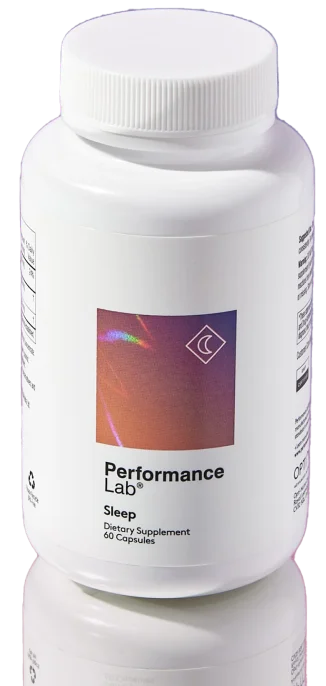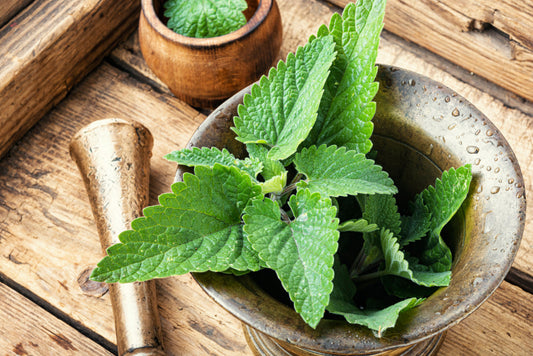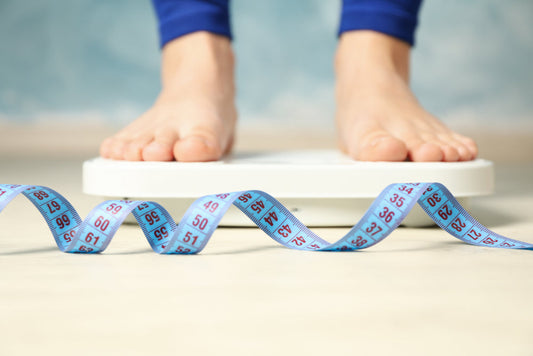If you’ve been reading up on how to improve your mood, reduce anxiety, or get better sleep, the chances are you’ve come across an article or two recommending either L-Tryptophan or 5-HTP supplements.
This is because these two compounds are often linked to the production of the brain chemical serotonin, known as amino acid precursors to serotonin.
We know that serotonin, a brain chemical, has the reputation as a ‘feel-good’ neurotransmitter. Serotonin helps regulate mood. But it goes beyond just a mood thing.
Serotonin is also linked to appetite control, cognition, digestion, immunity and of course… sleep.
So, whether the end goal is better mood or better sleep, promoting serotonin is going to be key.
And the great thing about serotonin, is that it comes with a whole side-hustle of additional benefits.
There are lots of supplements that are able to raise serotonin levels, but for this article we’re just going to compare L-Tryptophan to 5-HTP.
They sound quite similar: 5-Hydroxytryptophan (5-HTP) and L-Tryptophan—so how different can they be?
Let’s find out. L-Tryptophan vs 5-HTP—which is best?
Key Takeaways
Pressed for time? Here’s the short version:
- Serotonin Powerhouses: Both L-Tryptophan and 5-HTP help boost serotonin, which plays a key role in mood, sleep, appetite, and cognition.
- Different Pathways: L-Tryptophan is an essential amino acid that converts into serotonin but must compete with other amino acids to cross the blood-brain barrier. 5-HTP skips that step, making it a more direct serotonin booster.
-
Quick Fix vs. Long-Term Support:
- 5-HTP works faster but may lead to dopamine depletion over time.
- L-Tryptophan is safer for long-term use, offering broader benefits beyond serotonin.
- Why Performance Lab® Sleep Uses L-Tryptophan: It provides natural, non-habit-forming sleep support while also benefiting mood, stress, and cognition—without the risks of 5-HTP overuse.
-
Which Should You Choose?
- For short-term sleep struggles: 5-HTP might work faster.
- For consistent, sustainable sleep support: L-Tryptophan is the smarter choice.
- Looking for a science-backed, long-term sleep aid? That’s why we chose L-Tryptophan for Performance Lab® Sleep.
What is L-Tryptophan?

We’ll start by looking at tryptophan, which is an essential amino acid. It helps build proteins and produces key compounds like serotonin (5-HT), melatonin ( for sleep), kynurenine (for immune and brain function), and niacin (vitamin B3). (1)
Our body can’t produce it, so we need to get it from diet or supplements.
If you’re wondering what difference the ‘L’ makes to tryptophan: L-Tryptophan is just the natural form of tryptophan our body uses. There is another form, D-Tryptophan, but our bodies don’t normally use this form, our bodies prefer L-Tryptophan.
L-Tryptophan is the natural form of tryptophan our body uses. (2)
We can find L-Tryptophan in protein rich foods like poultry, seafood, dairy and red meat. If you prefer plant-based—tofu, edamame beans, and pumpkin seeds are also good sources. (3)
Why do we need it?
It plays an important role in mood, behavior, and cognition. And has been shown to support conditions like anxiety, insomnia, and depression. (4-8)
What is 5-HTP?

5-hydroxytryptophan, or 5-HTP, is a naturally occurring compound in the body that is produced during the metabolization of tryptophan. It is produced commercially from the seeds of the Griffonia simplicifolia plant.
5-HTP serves as a direct and clinically effective serotonin precursor, valuable for serotonin synthesis. Similar to tryptophan, 5-HTP has been or is commonly used for:
-
Sleep disorders and sleep disturbances - research suggests it may be more effective for poor sleepers (9)
-
Anxiety (10)
-
Fibromyalgia, early evidence suggests it may help reduce symptoms, but further research is needed. (11, 12)
-
Headaches. (13)
If you’ve looked at mood or sleep supplements before, you’ve probably seen 5-HTP included in every one of them.
Why? Because as a chemical by-product of L-Tryptophan, 5-HTP is also the immediate precursor to serotonin, which is then used to synthesize melatonin.
When the body metabolizes tryptophan, this is what happens:
L-Tryptophan → 5-Hydroxytryptophan (5-HTP) → Serotonin → N-Acetylserotonin → Melatonin
As you can see, both L-tryptophan and 5-HTP are used in the synthesis pathway of serotonin or melatonin.
Which might lead you to the question, “What’s the difference then?”
If they both eventually do the same job, does it really matter which you take?
The answer is yes. Here’s why.
What are the differences between L-Tryptophan and 5-HTP?
Although both of them synthesize the same compounds, the efficacy of these pathways is what sets them apart.
To go further into this, we need to talk briefly about the blood-brain barrier.
Significance of the blood-brain barrier (BBB)

Just as it sounds, this is a highly selective gate that only allows certain molecules to enter the brain.
Because neither serotonin nor melatonin can cross the BBB themselves, the body relies on precursors to increase serotonin levels in the brain. L-Tryptophan and 5-HTP are two possible precursors.
And this is where one outshines the other.
To cross the barrier, molecules like amino acids, need special transport proteins. These act like shuttles to carry them across.
Unfortunately, there’s a lot of competition for these ’shuttles’.
L-Tryptophan shares this transporter with larger amino acids like valine, leucine, isoleucine, and methionine. (14)
And when concentrations of these amino acids are higher—as is the case when you eat a high protein meal—tryptophan has to compete for a ‘seat’ on this transport shuttle.
And just like trying to squeeze onto a busy subway train, tryptophan may miss this ride completely, or have to wait for the next. As a result, a small amount of tryptophan ends up crossing the BBB into the brain.
Here, is where 5-HTP has a major advantage.
5-HTP doesn’t face competition from other amino acids to get through the blood-brain barrier.
While it still requires a specific transport system to enter the brain, 5-HTP bypasses the competitive bottleneck that L-Tryptophan encounters, allowing it to cross the BBB more efficiently. (15)
If you recall from the ‘What is Tryptophan’ section, compared to 5-HTP, L-Tryptophan is the more versatile nutrient. It has choices—it can become a protein; it can synthesize niacin (B3), or, it can take the serotonin pathway.
But 5-HTP? It can’t be used for anything else so where’s it going? It’s going straight to the brain to synthesize serotonin.
So 5-HTP is the winner then?
Yes and no. More on that next.
The Pros and Cons of L-Tryptophan and 5-HTP
Possible Dopamine Depletion?
Whilst 5-HTP gains access to the brain with relative ease, it competes with dopamine precursors (like L-DOPA) for the enzyme L-aromatic amino acid decarboxylase (AAAD). (16)
Early clinical trials and older research theorised that this could potentially lead to lower dopamine levels and other catecholamine deficiencies. Which in turn could potentially lead to an increased risk of depression, fatigue, and stress.
Some of this earlier research has since been retracted, so the situation is no longer quite as clear but logic would suggest that any competition may potentially impact levels of either compound.
Unlike 5-HTP, however, L-Tryptophan follows a different metabolic pathway (via tryptophan hydroxylase) to produce serotonin. It does not compete directly with dopamine, deplete dopamine or other catecholamines for AAAD, reducing the potential risk of any neurotransmitter imbalances.
Risk of Serotonin Syndrome

Taking too much 5-HTP for too long or taking it alone may lead to a dangerous condition called serotonin syndrome. (17)
This potentially serious condition is caused by having too much serotonin in the body. Symptoms range from anxiety or disorientation, through to seizures and even loss of consciousness.
Serotonin syndrome is rare when 5-HTP is taken alone, but it can happen if too many serotonin boosters are taken together, especially antidepressants like selective serotonin reuptake inhibitors (SSRIs). It may also occur if taking medications for other cognitive purposes, cough medicines, or prescription pain relievers.(18)
Low doses of L-Tryptophan appear to be safer, with side effects typically limited to mild cases of nausea, headaches, or drowsiness. While these are usually manageable, it’s crucial to monitor your body’s response and stick to recommended dosages. (19)
Again, however, do not take more than the recommended dose or with SSRIs or monoamine oxidase inhibitors (MAOIs) because of the risk of serotonin syndrome.
If you’re considering adding 5-HTP or tryptophan supplements to your routine - especially if you’re on other medications - always consult with a healthcare provider first. This helps ensure you avoid potentially serious interactions and get the most benefit with the least risk.
Clinical Applications

5-HTP
5-HTP has attracted attention in the medical community for its potential to help with a range of conditions linked to serotonin imbalance.
Research suggests that 5-HTP may be effective in managing mild to moderate depression, with at least one study showing results comparable to fluoxetine, an antidepressant medication. (20)
It’s also been explored as a treatment for anxiety disorders, panic disorder, and even chronic primary headache conditions like migraine headaches.
Beyond mood and anxiety, 5-HTP has shown promise in addressing symptoms of fibromyalgia and insomnia, making it a versatile option for those seeking natural support for these issues. (21)
However, while the evidence is encouraging, more research is needed to fully understand the benefits and risks of 5-HTP for these clinical applications.
If you’re considering 5-HTP supplements for depression, anxiety, or headache management, it’s essential to consult with a healthcare provider to ensure it’s safe and appropriate for your individual needs.
Tryptophan
Tryptophan has been widely researched for its potential impact (good and bad) on everything from cataracts to autism, cardiovascular disease, diabetes, kidney disease, cognitive decline and more. But it's its role on mental health issues and sleep disturbances that we're most interested in.
For instance, one study found that 1-3g of tryptophan a day plus early morning bright light exposure was more effective in helping patients with SAD, Seasonal Affective Disorder, than either treatment alone.
Another double blind study of generally anxious patients given 3g of l-tryptophan a day found that baseline anxiety reduced further than it did with a placebo. (22)
Studies have also shown that low levels of tryptophan are associated with an increased risk of depression, while high levels are positively associated with improved sleep quality and duration.
One study of older adults given cereals enriched with tryptophan concluded that it increased sleep efficiency and sleep time, while also improving symptoms of anxiety and depression. (23)
Best Tryptophan Sleep Aid: Performance Lab Sleep
Stress, mood, restlessness and a ‘chattering brain’ are all disruptors when it comes to sleep.
With that in mind, Performance Lab Sleep has ingredients to tackle all of them. These ingredients work by supporting the central nervous system, helping to regulate mood, promote relaxation, and encourage restful sleep.

Stress & Mood
Our formula includes a next-generation form of L-Tryptophan sourced from non-GMO, gluten-free vegetables
As we know, L-Tryptophan converts into serotonin, which helps regulate stress levels and relaxes your body in preparation for sleep. And since serotonin also converts into melatonin, it’s like a two-for-one deal for calming your system.
We've kept it to a modest 200mg of tryptophan to ensure a safe dosage.
We also added lemon balm extract, a traditional herb with modern scientific backing. It’s been shown to enhance GABA activity, a neurotransmitter that slows down your overactive nervous system. (24)
Restlessness
Maybe you’re tossing and turning, struggling to find the right position. Maybe you experience the odd leg twitch or suffer from restless leg syndrome. Either way, the magnesium in our Sleep formula works by activating the parasympathetic branch of the nervous system, which is responsible for inducing calmness and relaxation.
This is going to help relieve and relax muscle and joint aches - making it easier to slip back into sleep. (25)
Brain Chatter
Honestly, where does it all come from? And why?
If your brain charges through everything on your to-do list within seconds of your head hitting the pillow, lemon balm extract is going to help with that. Lemon balm boosts GABA which can help ‘calm’ that chatter.
Meanwhile Montmorency Tart Cherry melatonin is included to emulate the sedating effect of bedtime darkness. Helping you to naturally drift off to sleep AND regulate the circadian rhythm. So you can hopefully establish more consistent sleep patterns over time. (26)


Final Thoughts: L-Tryptophan vs 5 HTP for Sleep
Who’s the winner?
There’s no winner or loser in this situation. Whether you go with L-tryptophan or 5-HTP is going to depend on what you’re looking to get out of it.
For Mild Sleep Issues or Long-Term Support: L-Tryptophan might be the better choice because of its balanced effects and gentler action.
For Severe Sleep Problems or Quick Relief: 5-HTP is often a more effective short term solution due to its direct impact on serotonin and melatonin production.
If you’re looking for safe, long term support, with benefits that accumulate and build over time, L-Tryptophan is our favorite.














